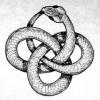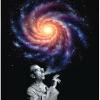More turnover = more variety generated per time unit = more DNA combinations thrown under whatever natural selection pressure exists at the time = faster evolution/adaptation per time unit
Ageing enhances natural selection pressure and provides more turnover for it to work with - so makes evolution faster.
If a food supply can sustain 100 animals of some species - if the animals age faster - there will be more turnover - and so more evolution. If the animals never age there will be almost no evolution. If you split them 50 vs 50, the 50 that ages will eventually evolve to outcompete the 50 eternal life forms.
This is why non-ageing animals are increasingly rare as evolution went on through time.
This is internally consistent, but doesn't it make the assumption that the beginning state was animals that don't age, or don't age much? It's hard to make animals that live a long time-- They need all sorts of elaborate repair mechanisms. It seems far more likely that early organisms aged rapidly, and only evolved longer lives if it improved reproductive fitness. In an environment of predation and infection, animals didn't need any extra help dying, so I don't see a driving force for evolution of aging.
Single cell life forms are pretty much immortal. Ageing developed in tandem with multicellularity and sexual reproduction in animals.
First multicellular lifeforms simply kept their "offspring" cells attached to them and this created primitive bodies. Eventually the attached offspring cells differentiated to form different tissues via parent cells leaking "enslaving"(differentiating) chemicals in a timed/triggered manner etc. This process of "growing (fruiting) bodies" eventually evolved into very complex proliferation sequences and within it - ageing developed - as a part of the sequence - the life cycle.
Similarly to the way multicellular body plan (how many legs/hand/segments etc) is determined by a set of HOX genes in basicly all animals https://en.wikipedia.org/wiki/Hox_gene, so is the lifecycle of the multicellular body determined by a set of FOX genes https://en.wikipedia...ki/FOX_proteins in all of them.
First multicellular animals didn't age rapidly, quite the contrary. The most primitive animal species we still have present today are often immortal or long lived - the most prominent are hydras or corals. As the evolutionary tree of life branched out - it became harder and harder for "immortal" animals to survive the competition from ageing animals within rich niches that can sustain a lot of turnover. It also became increasingly hard to for complex bodies to make large scale repairs from physical damage. It's one thing to grow a tentacle, but an entirely different thing to grow an arm with skeleton, knuckles, joints and muscles properly attached and innervated. It also became increasingly hard to sustain ever growing bodies (like the crustaceans among which there are some that also seem to grow and live indefinitely) as the vast differences in size require differences in behavior, different food etc.
And you are right, pressure from predators is similar to ageing pressure, but still, ageing enhances pressure from predators and makes for even better selection - against predators! If you have enough bodies to throw at it, why would this mechanism not evolve? Think long term...
If you have a system that produces steady evolution (species with sexual reproduction are exactly that) then you expect to have "better"/"more evolved" offspring than their parents (on average). If your offspring is expected to be more evolved why not kill off the parents in this ingenious way that provides more selection (and releases more resources/food for the young offspring - animals sometimes do need help dying, if they want to make room for their more evolved offspring)?
As body repairs are slowly stopped to a halt, the parent still has some fighting chance, depending on how good his final/mature state was. If it was good he'll survive a bit longer than some other member of the same species and make a few extra offspring in his lifetime thanks to his other important "niche abilities" which his species actively evolves, rather than general endless repair ability which evolved millions of years ago and was since "shunned" by most species. These few extra offspring will provide more spread of his proven and able genes that warrant a good final/mature state..... if the final/mature state developed from his genes was not good he'll die off faster as he begins to age and will not make the extra few offspring.
Species with most turnover produce most evolution: insects, fish, krill, season plants etc. The sheer number of species that evolved along those lineages is overwhelming and so is the even bigger number of already extinct species! Species with least turnover are usually "evolutionary" oldest in a sense - they are the same now as they were millions of years ago - living fossils.
BTW, welcome back, addx! You've been away for a while. This thread is keeping you busy; it's a lot to keep up with. Unicellular organisms that divide symmetrically don't age, at least in the right environment. The very earliest multicellular organisms might not have aged if they could divide continuously and reproduce by budding. Sophisticated multicellular organisms are another story, however. I think that aging of the soma may be a required consequence of the elaborate structure of such creatures. I understand the argument that death is a necessary part of evolution, and that quicker generations provide more adaptability, but we are left with the question of whether aging arose as a consequence of multicellularity and sexual reproduction, or if the earliest multicellular/sexual organisms were ageless, with aging arising later due to the evolutionary advantages it conferred. I'm not sufficiently versed in this area to argue it competently, but I can tell you what I think is the most likely-- That is that aging is a consequence of multicellularity and sexual reproduction. I suspect that early lifespans tended to be very short, primarily due to predation and infection, so the evolutionary advantages of aging never had a chance to exert any evolutionary pressure. I think it's more likely that long lifespans evolved, rather than the other way around.































































